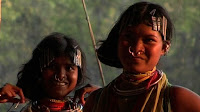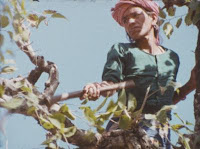Theme 1: KEEPERS OF FORESTS AND LIVES
These films were available to watch from 9-18th April 2022. We hope you enjoyed watching them and can share your responses on space.kriti@gmail.com If you missed seeing these films, look out for other upcoming screenings and festivals on Doculive.
(Anjali Khosla | 2019 | 06 mins | Marathi with English subtitles)
Over the years, the women of Pachgaon have earned sustaianabe livelihoods from their forests. They exercise an important role both in the protection of this natural resource and in local village governance.
Anjali Khosla is one of the founding members of Moving Images Films Pvt. Ltd., a production house that has produced several award-winning documentaries over the last 20 years. Most of the documentaries produced by them can be located in the area of “conservation and livelihoods," at the political interface between the environment and local communities in India.
(Girish Kasaravalli | 2002 | 132 mins | Kannada with English subtitles)
Nagi is the pillar of her small family that includes her husband and her rigid father-in-law. Faced with the possibility of losing her home due to the construction of a dam, Nagi proves her strength.
Girish Kasaravalli is an Indian film director in the Kannada cinema and one of the pioneers of Parallel Cinema. Known internationally for his works, Kasaravalli has garnered fourteen National Film Awards, including four Best Feature Films; Ghatashraddha, Tabarana Kathe, Thaayi Saheba and Dweepa.
(Sunanda Bhat | 2012 | 73 mins | Malayalam with English subtitles)
In a world that has grown more uncertain, where diversity and differences make way for standardisation and uniformity, the film explores the effects of a rapidly changing landscape on lives and livelihoods. Set in Wayanad, in South India, ‘Have you seen the arana?’ is a journey through a rich and biodiverse region that is witnessing drastic transformation in the name of development.
Sunanda Bhat is a documentary filmmaker based in Bangalore. She has made several award-winning documentaries and short films that have been screened in various international film festivals. Her interest in non-fiction films is to represent people living on the margins of an intricate and stratified Indian society. She looks at ways to bring in textures of landscape through layers of the lives of her characters.
(Suma Josson | 2010 | 17 mins | Odia with English subtitles)
‘Niyamgiri You Are Still Alive’ is a film that talks about the anti-bauxite mining campaign in Orissa, India, led by the indigenous communities against Sterlite — a subsidiary of the UK-based mining company Vedanta.
Suma Josson is an Indian-American journalist and filmmaker. Her documentary film ‘Niyamgiri, You are Still Alive’ on the ecological and human damage done by bauxite mining won a first prize in the Short Film, Environment category at the 2010 International Film Festival of India.
(Deepa Dhanraj | India | 1983 | 34 mins | Hindi with English subtitles)
The "Chipko" movement was founded in India by peasant women who recognised the economic consequences of deforestation of their regions and was one of the first environmental movements in the Third World. This is an account of "Sudesha," a woman who lives in the foothills of the Himalayas, who organised the women of her village to save the forests,thereby challenging the rules of Indian society and women's traditional roles.
Deepa Dhanraj is an award-winning filmmaker who has been actively involved in the women’s movement since 1980. Over the years, she has participated in workshops, seminars and discussion groups on various issues related to women’s status, political participation, health and education. Deepa has an extensive filmography spanning nearly three decades that include many series of films on education and health.
(Munmun Dhalaria | 2019 | 10 mins | English)
A journey into the Kingdom of Jujurana, one of the most vulnerable pheasants on our planet, residing in the backdrop of extreme socio-political pressures exerted on a beautiful temperate and subalpine forest landscape. The red-faced, blue-wattled, horned male of the species is a gorgeous pheasant, mesmerising the females with his breathtaking courtship dance. This short film on the filmmaker's journey into the kingdom of the Jujurana, highlights what it takes to protect this species at a time that India is rapidly losing its biodiversity.
Munmun Dhalaria, a NatGeoExplorer, is the director of MoonPeakFilms in India, which she founded in 2020, where she produces award-winning documentaries about nature, science, and social justice. Good filming ethics while delivering high-quality cinematic films, is embedded in her practice. In 2019, she made her first lm for NatGeo titled ‘The Jujurana’s Kingdom’.
(Yashavi Juyal | 2022 | 37 mins | Pahari with English subtitles)
In a small village in the mountains of Uttarakhand, a daughter is lured by the possibilities of city life, while her mother is haunted by the prospect of their land’s desolation.
Yashavi Juyal is a self-taught independent filmmaker & screenwriter from Uttarakhand, India. He has worked as a freelance director/cinematographer & editor for different studios, mostly developing food shows and contemporary fashion stories. In 2014 when started making independent films. His short documentary “A Wise Crab” was an official selection in JIO MAMI Mumbai Film Festival 2015.
Then Comes the Evening
(Maja Novakovic | 2020 | 28 min | Serbian with English subtitles)
Bitter poetry of everyday life in the isolated hills of Eastern Bosnia shows the care and intimacy of two old women, both in their mutual relations and in their relationship with nature.
Maja Novaković is an art historian from Belgrade. She learnt filmmaking at the Students’ City Cultural Centre – Academic Film Centre in Belgrade. Currently, Novaković is doing her PhD in "Poetics of heritage in the works of Sergei Parajanov" at the Department of Art History at the University of Belgrade. She also works at the Centre for Museology and Heritology at the same university, and as a research assistant at the Mathematical Institute in Belgrade.
(Vandana Menon, Vivek Sangwan, Debashish Nandi | 2020 | 09 mins | Odia with English subtitles)
Gunduribari is a tribal village nestled in the forests of the Nayagarh district of Odisha. Traditionally, the indigenous communities were the keepers of the forests and storehouses of conservation practices and knowledge systems. Over the centuries these communities began to be considered as “encroachers”. The Forest Rights Act (FRA), for the first time in 2006, recognises the rights of tribal communities to govern and sustainably use their surrounding forest areas.
Vandana Menon is a film maker, inter disciplinary visual artist & dramaturge based in Bangalore, India. Her work ranges from documentaries, & experimental films to live visual performances. She works with video, sound, animations and interactive technology. Her work as a visual artist pushes structural and technological boundaries creating multiple, even interactive narratives with image & sound.
Panel Discussion: Women and Forests
(held on 26.4.2022 as part of the Benglaluru edition of the festival)
(held on 26.4.2022 as part of the Benglaluru edition of the festival)
Meera Chandran (environmental lawyer and activist) and Parvathy Nagarajan (herbalist, natual healer and entrepreneur) speak about their work with forests and forest-dependent communities and inculcating values that help in nurturing forests.
Go back to main festival page!








Comments
Post a Comment